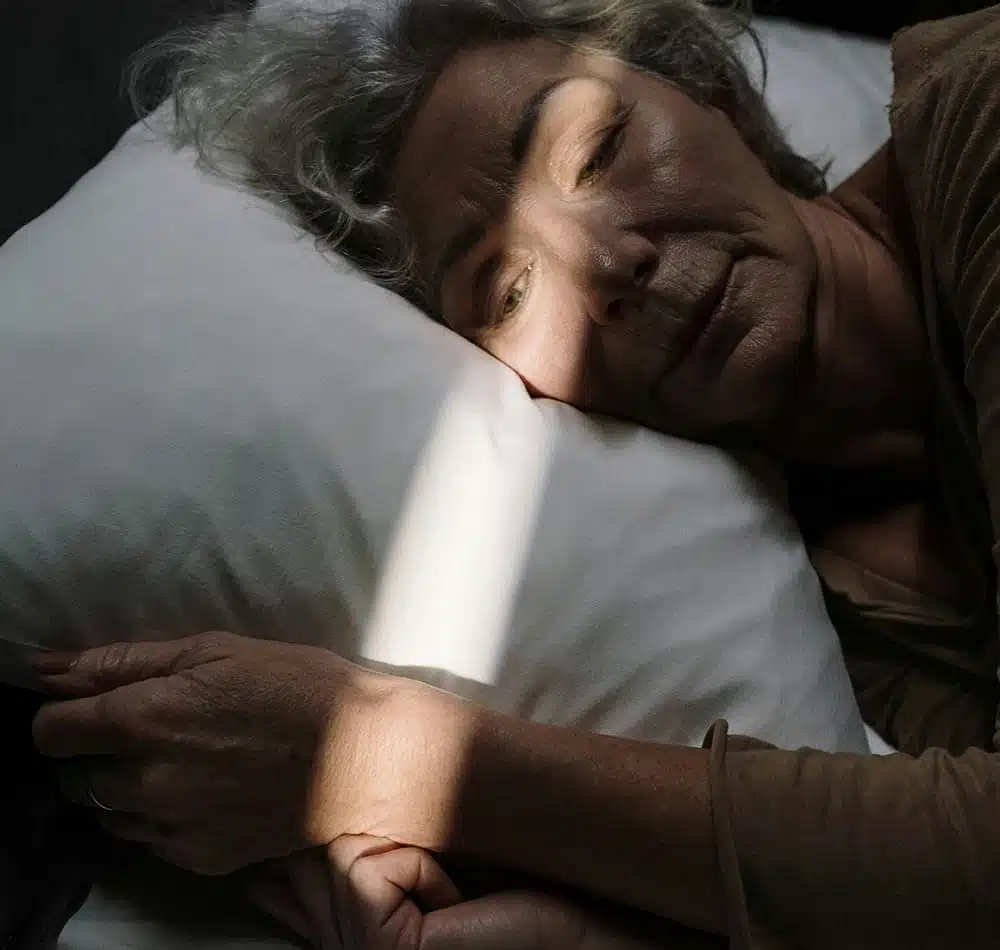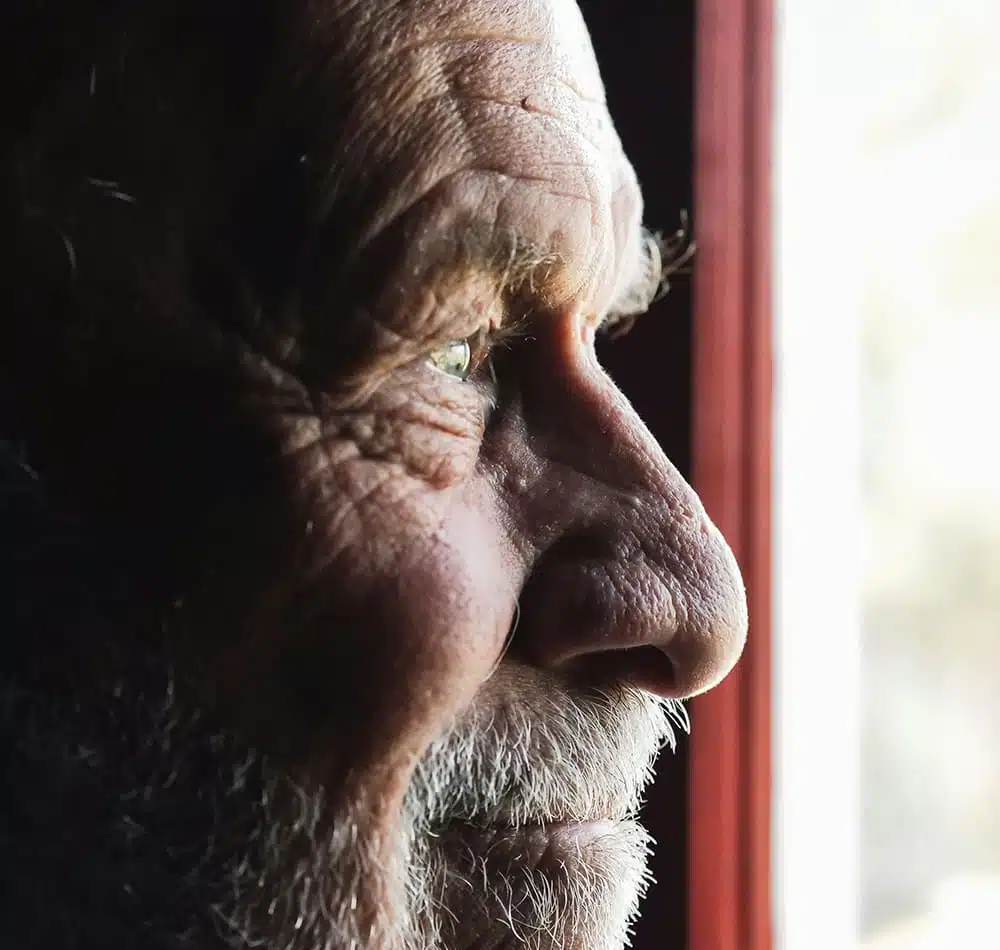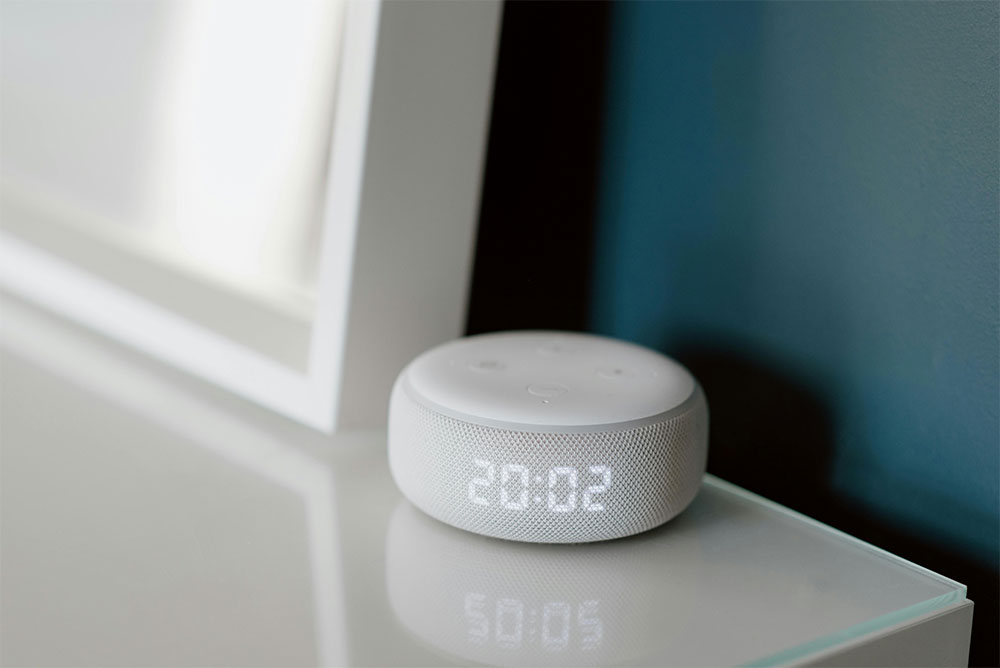Sleep disturbances are a common and challenging aspect of dementia and Alzheimer’s disease, affecting both patients and caregivers. However, with the right strategies and interventions, it’s possible to improve sleep quality and establish a more restful routine. This comprehensive guide offers expert tips and strategies for promoting sleep in dementia and Alzheimer’s patients, from establishing consistent routines to managing underlying medical conditions. Discover practical solutions to help your loved one get a good night’s sleep and improve their overall well-being.

Christopher Ravn
Key Takeaways
1. Sleep disturbances are common in dementia patients due to changes in the brain's sleep-wake cycle regulation and melatonin production.
2. Creating a consistent bedtime routine and a comfortable sleep environment can significantly improve sleep quality in dementia patients.
3. Nighttime wandering, or sundowning, is a frequent behavior in dementia patients, often triggered by disrupted sleep cycles, confusion, unmet needs, or environmental factors.
Table of Contents
1. How To Get Dementia Patients To Sleep At Night
2. How To Calm Dementia Patients At Night
3. How To Keep Dementia & Alzheimer Patients In Bed At Night
4. Why Do Dementia Patients Roam At Night?
5. How To Diagnose The Sleep Problems Of A Person With Dementia
6. How Does Sleep Affect Dementia Risk?
7. How To Stop Someone With Dementia From Leaving The House At Night
8. Frequently Asked Questions About How To Get Dementia Patients To Sleep At Night
How To Get Dementia Patients To Sleep At Night
- Degradation of neuronal pathways that regulate sleep-wake cycles
- Changes in the hypothalamic suprachiasmatic nucleus (the body’s internal clock)
- Modifications in brainstem regions and pathways that control sleep-wake cycles
Thus, it is important to have a consistent bedtime routine to train the body to know when it is time to sleep. This may include activities such as outdoor strolls, social interactions, establishing a regular sleep schedule, reading, listening to music, or even practicing gentle stretches.
It is important to create a comfortable bedroom environment to promote sleep. Hence, it is important to ensure that the environment is dark and quiet, use blinds or blackout curtains to reduce disturbances, maintain a comfortable temperature, consider using essential oils or scented pillow sprays, and ensure that the bedroom is free from clutter and distractions.
What Medication Helps Dementia Patients Sleep?
Medication is important to help dementia patients sleep and thus, it is important to consult a healthcare professional before commencing to take any medication. Types of medication to consider are melatonin, which helps regulate sleep-wake cycles; sedatives such as benzodiazepines and non-benzodiazepines, which may help dementia patients fall asleep faster and longer, antihistamines and antidepressants which may help dementia patients sleep due to their sedative effects.
The benefit of medications is that they help dementia patients sleep better, thus providing a better quality of life. However, the risk of medications is that they cause the patient to feel confused, dizzy, and prone to falls, and anticholinergic effects. A healthcare consultant must be consulted before beginning your journey to consume medication.
How To Calm Dementia Patients At Night
- Playing gentle and soothing music to reduce agitation
- Use certain scents, like lavender or vanilla, to calm dementia patients
- Massage them gently to reduce anxiety and agitation
Daytime physical activity plays a very important role in reducing restlessness and improving nighttime sleep in dementia patients. Physical activity may help to reduce restlessness, improve mood, and improve nighttime sleep quality.
It is important to have a familiar and safe environment to help reduce the impact of nighttime agitation. To create a supportive environment, it is important to ensure that it is calm and quiet, use familiar objects and decorations to create a sense of comfort, and avoid overstimulation from the environment with bright lights.
How To Calm Dementia Patients At Night In Hospital
It is challenging for dementia patients to be in an unfamiliar environment, as it disrupts their routine and provides sensory overload. Hence, it is important to think of strategies and collaborate with hospital staff to create a calm and positive environment for dementia patients. It is important to ensure that the patient continues to receive routine care such as meal times, bedtime rituals, and participation in their favorite activities. It is also important that caregivers stay with the dementia patient overnight and show them familiar objects, such as favorite clothing or pictures. It is also essential to reduce any form of noise and disturbance, dim their lights, and limit nighttime stimulants so that there may be medical procedures when necessary.
It is important to keep the dementia patient engaged with familiar objects and activities to reduce anxiety However, you will need to provide sensory stimulation that the patient may find comfortable, such as playing soft music therapy for dementia, aromatherapy, and a gentle massage. It is also essential to provide reminiscence therapy to evoke positive memories and if a patient becomes agitated, it is important to get them distracted with a simple activity.
Thus, it is important to communicate this with staff and inform them about the patient’s routine and preferences. Staff should be informed of the dementia patient’s medical history or any medications or allergies that they have. Finally, ensure that your loved one receives the love and care that they need so that they feel safe and comfortable in a new environment.

How To Keep Dementia & Alzheimer Patients In Bed At Night
- Reading a book or listening to soothing music
- Taking a warm bath or shower. At times, there may be resistance and so it is important to understand why won’t dementia patients take showers.
- Practicing gentle stretches or meditation
- Use light therapy for dementia
- Having a relaxing conversation or watching a calming movie
One will need to ensure that safety measures are put in place, such as bed rails, fall prevention devices or sensors, ensuring that the mattress is firm and removing hazards or clutter from the room.
It is important to work on any issues that the dementia patient may face while sleeping at night, such as being pain-free or any feelings of discomfort, frequent usage of the bathroom, and providing release from boredom, such as playing music, puzzles, or reading a book.
How Do Nursing Homes Keep Dementia Patients In Bed At Night?
Nursing homes use many strategies to ensure that dementia patients stay in bed at night. Some of the practices that they employ are monitoring the sleep environment, taking residents to the washroom at regular intervals, and using bed alarms to alert if anyone is getting out of bed. This helps to prevent the risk of falls or accidents.
Monitoring devices are used to ensure the safety of patients at night. This helps caregivers know about the dementia patients’ nighttime activity, prevent falls, and enhance their response time. It is also important that staff be given the necessary training to know how to manage nighttime behavior patterns and provide any form of emotional support and reassurance to dementia patients who need it.
We Believe Prioritizing Brain Health Enhances Your Quality Of Life
Get to know our team, our mission and how our EVY LIGHT® can provide you and your loved ones with a fuller life, letting you breathe a little easier.
Why Do Dementia Patients Roam At Night?
It is common for dementia patients to roam at night or late in the evening. This behavior is also known as sundownning, as this is the time when dementia patients show agitation, confusion, disorientation, and restlessness. Thus, it is important to employ strategies to ensure the safety and well-being of dementia patients and know what stage of dementia is sundowning.
Several factors can increase the likelihood of nighttime roaming in dementia patients. These are side effects from medication that have been used in anxiety or sleep disorders, changes in the environment, underlying medical conditions such as UTI or pain, or psychiatric symptoms such as depression.
To implement strategies for nighttime roaming, it is important to have a consistent daily routine to regulate the sleep-wake cycle, ensure that the dementia patient takes part in physical and mental activities, avoid caffeine and sugary drinks in the afternoon and evening, keep the environment quiet, and ensure that the patient is well fed and stays hydrated.
Why Do Dementia Patients Yell At Night?
Dementia patients may yell at night due to a myriad of reasons, such as fear of being alone or in the dark, a feeling of discomfort from physical pain, or unmet needs such as hunger or thirst. To soothe and calm a yelling patient, one needs to speak calmly and gently, offer reassurance and comfort by using a gentle touch, identify the source of the yelling and distract or redirect it by allowing them to focus on a relaxing activity.
If yelling persists, the patient and caregiver need to seek help from a healthcare professional to identify and address any issues with the yelling, such as pain or unmet needs. The healthcare professional may also offer guidance on managing the dementia patient’s behavior, prescribe medication to manage their symptoms and provide emotional support and guidance to the caregiver.
How To Diagnose The Sleep Problems Of A Person With Dementia
To diagnose the sleep problems of a person with dementia, it is important to seek guidance from a healthcare professional to run sleep studies, questionnaires, and clinical evaluations. The main sleep test is polysomnography (PSG), which provides information on the sleep stages or if there is restless leg syndrome or sleep apnea. To add on, actigraphy, which uses a non-invasive method, may be used to assess sleep-wake cycles. Questionnaires such as the Sleep Disorders Inventory may help identify sleep issues and monitor them to see if the treatment is effective.
- Sleep apnea: a condition characterized by repeated episodes of shallow or paused breathing during sleep
- Restless leg syndrome: a condition characterized by an uncontrollable urge to move the legs, often accompanied by uncomfortable sensations
- Periodic limb movement disorder: a condition characterized by repetitive movements of the legs or arms during sleep
- REM Behavioral Sleep Disorder (RBD): a condition characterized by acting out dreams during REM sleep
What Causes Dementia Sleep Disorders?
Sleep disorder affect around 70% of patients who have been diagnosed with early-onset dementia. There are a few factors contributing to these sleep disorders, such as changes in the brain’s neurotransmitters, disruptions in the patient’s circadian rhythm, and sleep apnea or chronic obstructive pulmonary disease (COPD).
Medications may contribute to sleep issues in dementia patients, such as the use of anticholinergics, antihistamines, and benzodiazepines. To add on, other health issues may affect sleep in dementia patients, such as depression, anxiety, and other medical conditions such as respiratory issues, chronic pain, and incontinence.

Enhance your brain performance through the power of light.
Comfortable and easy to use 40Hz light therapy to support and improve your brain function.
View Our LightHow Does Sleep Affect Dementia Risk?
Sleep plays a crucial role in brain health, and poor sleep quality has been linked to an increased risk of developing dementia. During sleep, the brain clears out waste products and consolidates memories, processes essential for cognitive function. Chronic sleep deprivation or disrupted sleep can hinder these processes, potentially contributing to the buildup of harmful proteins associated with dementia, such as amyloid plaques.
Research has shown a correlation between sleep disorders like sleep apnea and an elevated risk of dementia. Additionally, studies have found that individuals who consistently get less than six hours of sleep per night may have a higher risk of cognitive decline.
How Does Dementia Change Sleep Patterns?
- Changes in sleep: Dementia alters the normal sleep stages, particularly reducing the amount of deep, restorative sleep (slow-wave sleep) and REM sleep, which is crucial for memory consolidation and cognitive function. This can lead to daytime fatigue, impaired concentration, and worsening cognitive symptoms.
- Daytime napping: People with dementia often experience increased daytime sleepiness and tend to take frequent naps. While napping might seem beneficial, it can disrupt the natural sleep-wake cycle, making it harder to fall asleep at night and leading to fragmented sleep.
- Dementia patients frequently experience sleep fragmentation, which is characterized by frequent awakenings throughout the night. This can be due to various factors, including discomfort, pain, medication side effects, or underlying medical conditions. Sleep fragmentation further compromises sleep quality and contributes to daytime fatigue and cognitive impairment.
How To Stop Someone With Dementia From Leaving The House At Night
Sleep problems are a common feature of dementia, significantly affecting both patients and caregivers. As dementia progresses, the brain undergoes changes that disrupt the normal sleep-wake cycle, leading to issues such as insomnia, fragmented sleep, and increased daytime napping. This disruption is partly due to damage to brain regions responsible for regulating sleep, as well as changes in the production of melatonin, a sleep-regulating hormone. These sleep disturbances not only worsen cognitive function and behavioral symptoms in dementia patients but also place a significant burden on caregivers, who often experience sleep deprivation and fatigue.
Understanding the link between dementia and sleep is crucial for managing the disease effectively. Strategies to improve sleep in dementia patients include maintaining a consistent sleep schedule, creating a calming bedtime routine, avoiding caffeine and alcohol before bed, and ensuring a comfortable sleep environment. If sleep problems persist, consulting a healthcare professional is recommended, as they can assess the underlying causes and recommend appropriate treatments, such as medication or cognitive behavioral therapy for insomnia. Addressing sleep issues can significantly improve the quality of life for both the person with dementia and their caregivers.
Learn What Others Have Experienced with EVY Light
See how others have achieved a sharper mind by activating their gamma brainwaves in combination with maintaining a healthy lifestyle.
Frequently Asked Questions About How To Get Dementia Patients To Sleep At Night
How To Get A Dementia Patient To Sleep?
To get a dementia patient to sleep, it is important to have a consistent bedtime routine to train the body to know when it is time to sleep. This may include activities such as outdoor strolls, social interactions, establishing a regular sleep schedule, reading, listening to music, or even practicing gentle stretches.
Why Do Dementia Patients Roam At Night?
It is common for dementia patients to roam at night or late in the evening. This behavior is also known as sundownning, as this is the time when dementia patients show agitation, confusion, disorientation, and restlessness. Thus, it is important to employ strategies to ensure the safety and well-being of dementia patients and know what stage of dementia is sundowning























